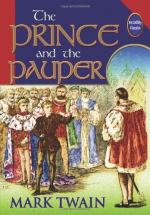Tom urged—the woman still adhered to her declarations. Finally he said—
“I think the woman hath said true. An’ my mother were in her place and gifted with the devil’s functions, she had not stayed a moment to call her storms and lay the whole land in ruins, if the saving of my forfeit life were the price she got! It is argument that other mothers are made in like mould. Thou art free, goodwife—thou and thy child—for I do think thee innocent. Now thou’st nought to fear, being pardoned—pull off thy stockings!—an’ thou canst make me a storm, thou shalt be rich!”
The redeemed creature was loud in her gratitude, and proceeded to obey, whilst Tom looked on with eager expectancy, a little marred by apprehension; the courtiers at the same time manifesting decided discomfort and uneasiness. The woman stripped her own feet and her little girl’s also, and plainly did her best to reward the King’s generosity with an earthquake, but it was all a failure and a disappointment. Tom sighed, and said—
“There, good soul, trouble thyself no further, thy power is departed out of thee. Go thy way in peace; and if it return to thee at any time, forget me not, but fetch me a storm.” {13}
Chapter XVI. The State Dinner.
The dinner hour drew near—yet strangely enough, the thought brought but slight discomfort to Tom, and hardly any terror. The morning’s experiences had wonderfully built up his confidence; the poor little ash-cat was already more wonted to his strange garret, after four days’ habit, than a mature person could have become in a full month. A child’s facility in accommodating itself to circumstances was never more strikingly illustrated.
Let us privileged ones hurry to the great banqueting-room and have a glance at matters there whilst Tom is being made ready for the imposing occasion. It is a spacious apartment, with gilded pillars and pilasters, and pictured walls and ceilings. At the door stand tall guards, as rigid as statues, dressed in rich and picturesque costumes, and bearing halberds. In a high gallery which runs all around the place is a band of musicians and a packed company of citizens of both sexes, in brilliant attire. In the centre of the room, upon a raised platform, is Tom’s table. Now let the ancient chronicler speak:
“A gentleman enters the room bearing a rod, and along with him another bearing a tablecloth, which, after they have both kneeled three times with the utmost veneration, he spreads upon the table, and after kneeling again they both retire; then come two others, one with the rod again, the other with a salt-cellar, a plate, and bread; when they have kneeled as the others had done, and placed what was brought upon the table, they too retire with the same ceremonies performed by the first; at last come two nobles, richly clothed, one bearing a tasting-knife, who, after prostrating themselves three times in the most graceful manner, approach and rub the table with bread and salt, with as much awe as if the King had been present.” {6}




